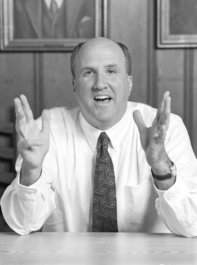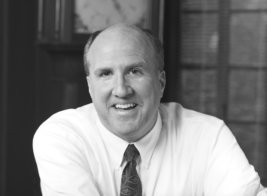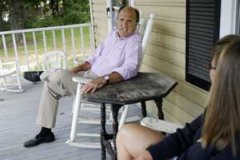It’s come to my attention that there are some unnamed others (oh, it’s possible I’ll name him once a little later on, for the benefit of the newcomers) in the Retire Early community attracting those Google spiders with articles arguing that “Rob Bennett is a Bad Father” and “Rob Bennett Doesn’t Invest in the Things That I Think He Should Invest In” and “Rob Bennett Doesn’t Always Take the Trash out the First Time He is Asked to Do So” and all other sorts of jibber-jabber. I figure, why shouldn’t I get in on the action? Outside of the poor girl who accepted his ring, no one knows better than I do about the weaknesses of this Rob Bennett individual, eh?
Rob Bennett’s first weakness as a money advisor is that he’s a Numbers Dunce.
Even a cosmic idiot like John Greaney (there, I did it!) gets to hit a line drive every now and again. He says that I am afraid of “Big Scary Numbers.” He’s right. Numbers are hard things, cold things, scary things. I think I’ve got good cause to be afraid of them.
 Does it hold me back in the work I do handing out advice to unfortunate passers-by as to how to save and how to invest and how to advance in their careers and all such? It does. Numbers come up a lot in writings about money topics. I could move faster and extend my reach to topics that I now hesitate to touch if I had greater confidence in my skill with numerical calculations.
Does it hold me back in the work I do handing out advice to unfortunate passers-by as to how to save and how to invest and how to advance in their careers and all such? It does. Numbers come up a lot in writings about money topics. I could move faster and extend my reach to topics that I now hesitate to touch if I had greater confidence in my skill with numerical calculations.
There’s another side to the story. I read a book once about the Myers-Briggs personality assessment tool. It said that those who are especially skilled in one department (let’s say “Thinking”) tend not to be skilled at all in its alternative (“Feeling” is the alternative to “Thinking,” in the Myers-Briggs system). If that’s so, then it may be that I possess a great strength in the “Feeling” department that rules out me having much strength in the “Thinking” department (those who possess strong numbers skills tend to be Thinkers, not Feelers).
There are lots of people writing in the personal finance field who are strong Thinkers. I believe that we need more with strength as Feelers to even things out a bit.
Of course, I would, wouldn’t I?
Rob Bennett’s second weakness as a money advisor is that he’s slow to act.
You might have noticed that my post on the morning of May 13, 2002, has caused a bit of a stir at several of the Retire Early boards. There were a good number who questioned me when I suggested that perhaps we should be taking valuations into account when calculating safe withdrawal rates (SWRs). I think it would be fair to say that I have been vindicated on that one by the work that our community has done in the five years since.
I now sometimes wish that I had come forward sooner. I was reasonably confident that the Old School SWR studies were analytically invalid back in late 1995. Perhaps if this matter had been brought to the table sooner, things would not have turned out the way they have. Perhaps people would have been more open to acknowledging their errors if they hadn’t given bad advice to so many based on their earlier understanding of the realities. Perhaps the discussions would have been just as nasty, but we would have worked our way past the nasty part by now had I come forward back in 1999 or 2000. Perhaps some of the people who began retirements in the late 1990s or early 2000s that are likely to go bust somewhere down the road would have not acted so imprudently had we began our valuation discussions a few years earlier.
Woulda, coulda, shoulda, right?
I wanted to be absolutely sure on that one. My lack of skill with numbers made me doubt myself just a tiny bit, and the hostility that arose whenever the subject of valuations came up made me reluctant to move forward on something re which I wasn’t entirely sure. Perhaps I was right to hold back for a bit, perhaps I was wrong. I don’t think it’s possible to say for sure.
It is possible to say for sure that I am generally slow to act, however. The Myers-Briggs people would describe me as “methodical.” That’s generally a good trait in a money advisor. You want your money advisor to be sure about what he tells you. Like many things down here in the Valley of Tears, however, being methodical has its drawbacks. There are times when I am probably too cautious, when I sense that something is so but hold back from saying it in direct and clear terms because I am not yet entirely sure. If you read something I wrote and notice a case where you think that might be what’s going on, you might want to ask a question at the blog and see if you can prompt me into exploring the implications a wee bit more than I am personally inclined to at the moment.
Rob Bennett’s third weakness as a money advisor is that he didn’t study this stuff in school.
 I don’t have zero background. I took five accounting courses, two economics courses, and one statistics course in college. I have a law degree and a masters in the law of taxation. I wrote for tax newsletters for nine years and worked for one of the big accounting firms (as a lobbyist and a Writing Center Director) for nine years. I’ve been writing on a daily basis at our boards for close to eight years and have become familiar with just about every topic that comes up in discussions of putting together a successful plan for early retirement. Still, I don’t have a piece of paper with a fancy seal and writing in Latin that indicates that I am a true “Monius Expertatum.”
I don’t have zero background. I took five accounting courses, two economics courses, and one statistics course in college. I have a law degree and a masters in the law of taxation. I wrote for tax newsletters for nine years and worked for one of the big accounting firms (as a lobbyist and a Writing Center Director) for nine years. I’ve been writing on a daily basis at our boards for close to eight years and have become familiar with just about every topic that comes up in discussions of putting together a successful plan for early retirement. Still, I don’t have a piece of paper with a fancy seal and writing in Latin that indicates that I am a true “Monius Expertatum.”
Does that hurt me? Yes. If I had the degree, I would be better able to put what I know into context. I would know more about the entire literature of personal finance, not just the parts that focus on early financial freedom (I’ve studied those on my own). The big benefit of getting a degree is that you are forced to study things you are not inclined to study on your own. That broadens you.
It’s not only by taking courses that we learn about a field of knowledge, however. I’ve learned things on our boards that are not discussed in textbooks. The textbooks focus on the ways that most people go about saving. Many of our community members don’t do what most people do. They want to retire early, so they follow strategies that lead to greater success than the strategies discussed in the textbooks. I’d like to have a degree in the field. But I’m proud to have learned what I’ve learned just the way I’ve learned most of it, by talking it over with you and thousands of others trying to do the remarkable things that you are trying to do.
Rob Bennett’s fourth weakness as a money advisor is that he talks too much.
I post long. Always have, always will. Those who don’t like long posts flipped off this channel a long time ago. Those who don’t mind so much are stuck with me. It looks like we’re pretty much hitched-up, fellow Passion Saver. Let’s make the best of it!
I think long posts are just fine. The stuff we’re talking about here is important stuff. We need to include caveats. We need to explain our thinking. We need to put forward multiple strategies for achieving whatever goal it is that is under discussion. Long posts are appropriate in Retire Early World.
The downside is that long posts really do turn a lot of people off. People want their money insights delivered fast, just like their pizzas. That’s doubly true on the internet. There’s one that I wrote on buy-and-hold investing that clocks in at 8,000 words. I mean, come on. It’s my understanding that that’s a felony in several of the southern states. There are lines that civilized people do not cross.
There are times when I probably go on too long. I’ll try to watch it. I think that we need to explore the ins and outs a good bit. But I sometimes probably need to rein it in some.
Rob Bennett’s fifth weakness as a money advisor is that he’s stuck in the 60s.
The Goons make fun of just about everything I say. Over on the Vanguard Diehards board, they attacked me once for saying that I liked the Honeymooners television program. They said that that showed that I beat my wife and kids. To the moon, Goon! They never make too much of a big deal out of the fact that most of my song references are from the 60s and early 70s. That’s something I view as a true weakness. It seems to me that, if you are going to be sticking song lyrics into your personal finance material, you should at least make an effort to keep things fresh.

I don’t have the time for music today that I had back then. That’s the thing. The sand is passing through the hourglass too quickly.
Rob Bennett’s sixth weakness as a money advisor is that he focuses on emotions.
This is my greatest strength. I include it in my list of weaknesses because it can be counted as a weakness too, depending on what you were hoping to find here when you filled out the form and paid your dues.
Sometimes at the blog someone will ask a basic practical question, like “so how exactly is it that one buys one of these TIPS or IBonds things that you are always going on and on about?” Asking one of those sorts of questions is the best way to shut me up. I usually have a vague idea as to the answer. I’ve purchased TIPS and IBonds myself, so I of course have some idea as to the procedure that needs to be followed.
My experience is limited, however, and I am just smart enough to know that there are complexities that comes into play in the money area even when completing the most seemingly simple of transactions. So I prefer to have other people respond to those sorts of questions. If no one else picks up the ball, sometimes I will. I don’t feel that I possess much expertise on the practical/technical side, however. I make an effort to include warnings to that effect whenever I respond to one of those sorts of questions.
This is a true weakness. It would be nice if I were The Answer Grape and I could tell you whatever you wanted to know about any money question without having to consult notes. I can’t, though. Part of the reason why I got out of the accounting firm is that it was clear to me that I could never rise to the top competing with tech-heads (I mean no disparagement — these people do important work). I think that God meant for them to do what they do and for me to do what me do. What we do. What us do. Oh, you know what I’m getting at. What I do!
Rob Bennett’s seventh weakness as a money advisor is that he cares too much.
I care about this stuff intensely. You probably don’t think of that as a weakness, and usually it’s not. It’s possible to care about something too much, though. A mother can so much want to protect her child that she doesn’t let him cross the street by himself even when he’s old enough to do so. Even caring can become a bad thing when taken to an extreme.
I get the sense that a good number think that I shouldn’t talk to the Goons at all. I talk because I care. I care about them and I care about what they have done to us and I care about what it is in human nature and in the investing project that makes the Goon phenomenon a reality in Retire Early World in the year 2007. My heart tells me that we can learn more by caring and trying to understand than we can by ignoring and cowering in fear.
It may be that there are things that my heart is not able to take in. Or it may be that my heart is spot on. Time will tell the tale. Please put this one down as a possible weakness.
Rob Bennett’s eighth weakness as a money advisor is that he’s an egomaniac.
 That’s what my wife tells me. She says: “Rob, I love you, but you are an egomaniac.” She’s supposed to be the one who tells me things that others won’t tell me. That’s her job. It’s because of her straight-talking ways that she was the one who got the ring.
That’s what my wife tells me. She says: “Rob, I love you, but you are an egomaniac.” She’s supposed to be the one who tells me things that others won’t tell me. That’s her job. It’s because of her straight-talking ways that she was the one who got the ring.
It’s not just Boo either. The Goons one time put something up on some internet dictionary saying that “Hocomania” should be accepted as a new word. There was a guy who objected that the term was being used to further a smear campaign. Then he provided background on The Hocomania Phenomenon. He said that I make “grandiose” claims about the power of analytically valid safe-withdrawal-rate studies to help people invest successfully for the long run.
It’s grand claims! I make grand claims, I’ll give you that. Not grandiose. There’s a difference.
I don’t think I have a big head. I think our community has done wonderful work, work that will in time have revolutionary impact in both the saving area and the investing area. That’s my sincere take.
If you ever suspect that I’m getting carried away in something I am saying, please know that my wife (who really does love me bunches and bunches and who is loved by me bunches and bunches in return) thinks that I have a case of Big-Head Disease and that there’s some fellow on the internet who is generally not biased against me who seems to agree with her. I’m just going to keep on doin’, but I want you to know that you are not the only one who has ever pondered these questions.
Rob Bennett’s ninth weakness as a money advisor is that he can’t go deep.
I’m a let’s-review-the-basics-again guy. Don’t come to me looking for tricky or advanced strategies. My aim is to get the basics precisely right.
I find no fault with those who look at the tricky and advanced strategies. I can’t go there, that’s all.
I think we serve up the basics darn good here at www.PassionSaving.com. And I think the basics are important. So I make no apologies re this one. I provide fair notice, however, that I cannot go deep. God did not provide me with the required skill set. God has spoken and that’s that.
Rob Bennett’s tenth weakness as a money advisor is that he has both too much money and too little money.
I worry that I have too much money for many moderate-income workers to feel comfortable with the money advice offered here. These are my people and I want to hear from them. Not everyone can make the amount of money that I made in my legal jobs, but the principles that I employed to save large chunks of that money are principles that can work well for those with more modest incomes. Please don’t hold it against me that for a few years I made a six-figure salary.
 I take worse hits from the other side, of course. The Goons argue that I have not too much saved but too little, that I never should have left my corporate job until I had enough saved never to need to work again. That’s dumb. I don’t need you to worry for me cause it’s my life. Go ahead with your own life — leave me alone!
I take worse hits from the other side, of course. The Goons argue that I have not too much saved but too little, that I never should have left my corporate job until I had enough saved never to need to work again. That’s dumb. I don’t need you to worry for me cause it’s my life. Go ahead with your own life — leave me alone!
They have a tiny sliver of a point, though. People come here looking for advice on how to win financial freedom early in life. Wouldn’t it be better if I possessed complete financial freedom?
In one sense, yes. In another sense, no.
We’re still in the learning stage re this Retire Early/Financial Freedom thing. None of us yet has all the answers. I learn more from our interactions as a result of the reality that I have not yet been delivered to the promised land than I would if I had millions in the bank and couldn’t figure out any way to spend it all in one lifetime.
I wish I had more. That much is fair to say. That would be better for me. I think it’s better for you that I don’t. I think we all learn more watching me struggle and squirm under the pressures imposed by the forces trying to stop me (all of us, really) from reaching The Up Escalator.
Could be!
Who knows?
There’s something due any day;
I will know right away,
Soon as it shows.
It may come cannonballing down through the sky,
Gleam in its eye,
Bright as a rose!— “Something’s Coming,” West Side Story
Music by Leonard Bernstein, lyrics by Stephen Sondheim
